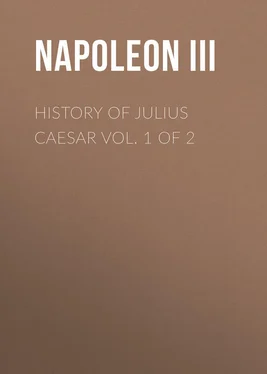Napoleon III - History of Julius Caesar Vol. 1 of 2
Здесь есть возможность читать онлайн «Napoleon III - History of Julius Caesar Vol. 1 of 2» — ознакомительный отрывок электронной книги совершенно бесплатно, а после прочтения отрывка купить полную версию. В некоторых случаях можно слушать аудио, скачать через торрент в формате fb2 и присутствует краткое содержание. Жанр: foreign_antique, foreign_prose, Биографии и Мемуары, на английском языке. Описание произведения, (предисловие) а так же отзывы посетителей доступны на портале библиотеки ЛибКат.
- Название:History of Julius Caesar Vol. 1 of 2
- Автор:
- Жанр:
- Год:неизвестен
- ISBN:нет данных
- Рейтинг книги:5 / 5. Голосов: 1
-
Избранное:Добавить в избранное
- Отзывы:
-
Ваша оценка:
- 100
- 1
- 2
- 3
- 4
- 5
History of Julius Caesar Vol. 1 of 2: краткое содержание, описание и аннотация
Предлагаем к чтению аннотацию, описание, краткое содержание или предисловие (зависит от того, что написал сам автор книги «History of Julius Caesar Vol. 1 of 2»). Если вы не нашли необходимую информацию о книге — напишите в комментариях, мы постараемся отыскать её.
History of Julius Caesar Vol. 1 of 2 — читать онлайн ознакомительный отрывок
Ниже представлен текст книги, разбитый по страницам. Система сохранения места последней прочитанной страницы, позволяет с удобством читать онлайн бесплатно книгу «History of Julius Caesar Vol. 1 of 2», без необходимости каждый раз заново искать на чём Вы остановились. Поставьте закладку, и сможете в любой момент перейти на страницу, на которой закончили чтение.
Интервал:
Закладка:
Debts. – The question of debts and the diminution of the rate of interest had long been the subject of strong prejudices and of passionate debates.
As the citizens made war at their own expense, the less rich, while they were under arms, could not take care of their fields or farms, but borrowed money to provide for their wants and for those of their families. The debt had, in this case, a noble origin, the service of their country. 143 143 “Marcus Valerius demonstrated to them that prudence did not permit them to refuse a thing of small importance to citizens who, under the government of the kings, had distinguished themselves in so many battles for the defence of the Republic.” (Year of Rome 256.) (Dionysius of Halicarnassus, V. 65.) – “On one hand, the plebeians pretended not to be in a condition to pay their debts; they complained that, during so many years of war, their lands had produced nothing, that their cattle had perished, that their slaves had escaped or had been carried away in the different incursions of the enemies, and that all they possessed at Rome was expended for the cost of the war. On the other hand, the creditors said that the losses were common to everybody; that they had suffered no less than their debtors; that they could not consent to lose what they had lent in time of peace to some indigent citizens in addition to what the enemies had taken from them in time of war.” (Year of Rome 258.) (Dionysius of Halicarnassus, VI. 22.)
Public opinion must, therefore, be favourable to the debtors and hostile to those who, speculating on the pecuniary difficulties of the defenders of the State, extorted heavy interest for the money they lent. The patricians also took advantage of their position and their knowledge of legal forms to exact heavy sums from the plebeians whose causes they defended. 144 144 Those who pleaded the causes of individuals were nearly all senators, and exacted for this service very heavy sums under the title of fees. (Titus Livius, XXXIV. 4.)
The kings, listening to the demands of the citizens who were overwhelmed with debts, often showed their readiness to help them; 145 145 “The days following, Servius Tullius caused a report to be drawn up of the insolvent debtors, of their creditors, and of the respective amount of their debts. When this was prepared, he caused counters to be established in the Forum, and, in public view, repaid the lenders whatever was due to them.” (Dionysius of Halicarnassus, IV. 10.)
but, after their expulsion, the rich classes, more independent, became more untractable, and men, ruined on account of their military service, were sold publicly, as slaves, 146 146 “Servilius caused a herald to proclaim that all persons were forbidden to seize, sell, or retain in pledge the goods of Romans who served against the Volsci, or to take away their children, or any one of their family, for any contract whatever.” – “An old man complains that his creditor has reduced him to slavery: he declares loudly that he was born free, that he had served in all the campaigns as long as his age permitted, that he was in twenty-eight battles, where he had several times gained the prize of valour; but that, since the times had become bad, and the Republic was reduced to the last extremity, he had been constrained to borrow money to pay the taxes. After that, he added, having no longer wherewith to pay my debts, my merciless creditor has reduced me to slavery with my two children, and, because I expostulated slightly when he ordered me to do things which were too difficult, caused me to be disgracefully beaten with several blows.” (Year of Rome 259.) (Dionysius of Halicarnassus, VI. 29.) – “The creditors contributed to the insurrection of the populace, they cast aside all moderation, but threw their debtors into prison, and treated them like the slaves whom they would have bought for money.” (Year of Rome 254.) (Dionysius of Halicarnassus, V. 53.)
by their creditors. Thus, when war was imminent, the poor often refused to serve, 147 147 “The poor, especially those who were not in condition to pay their debts, who formed the greatest number, refused to take arms, and would hold no communication with the patricians, until the Senate should pass a law for the abolition of debts.” (Year of Rome 256.) (Dionysius of Halicarnassus, V. 63.)
crying out, “What use will it be to us to conquer the enemies without, if our creditors put us in bonds for the debts we have contracted? What advantage shall we have in strengthening the empire of Rome, if we cannot preserve our personal liberty?” 148 148 Dionysius of Halicarnassus, V. 64.
Yet the patricians, who contributed more than the others to the costs of the war, demanded of their debtors, not without reason, the payment of the money they had advanced; and hence arose perpetual dissensions. 149 149 Appius Claudius Sabinus expressed an opinion quite contrary to that of Marcus Valerius: he said that “there could be no doubt that the rich, who were not less citizens than the poor, and who held the first rank in the Republic, occupied the public offices, and had served in all the wars, would take it very ill if they discharged their debtors from the obligation of paying what was due.” (Year of Rome 256.) (Dionysius of Halicarnassus, V. 66.)
In 305, the laws of the Twelve Tables decided that the rate of interest should be reduced to ten per cent. a year; but a law of Licinius Stolo alone resolved, in an equitable manner, this grave question. It enacted that the interests previously paid should be deducted from the principal, and that the principal should be repaid by equal portions during an interval of three years. This measure was advantageous to all, for, in the state of insolvency in which the debtors were involved, the creditors could not obtain the interest of their money, and even risked the loss of the principal; the new law guaranteed the debts; the debtors in their turn, having become landed proprietors, found the means of freeing themselves by means of the lands they had received and the delay which had been given them. The agreement established in 387 was of slight duration, and in the midst of disagreements more or less violent, things were carried so far, in 412, that the entire abolition of debts and the prohibition to exact any interest were decreed mere revolutionary and transitory measures.
Résumé.
V. This rapid sketch of the evils already perceptible which tormented Roman society leads us to this reflection: it is the lot of all governments, whatever be their form, to contain within themselves germs of life, which make their strength, and germs of dissolution, which must some day lead to their ruin; and accordingly, as the Republic was in progress or in decline, the first or the second became developed and dominant in turn; that is, so long as the aristocracy preserved its virtues and its patriotism, the elements of prosperity predominated; but no sooner did it begin to degenerate, than the causes of disturbance gained the upper hand, and shook the edifice which had been erected so laboriously.
If the fall of the kingly power, in giving more vitality and independence to the aristocracy, rendered the constitution of the State more solid and durable, the democracy had at first no reason for congratulation. Two hundred years passed away before the plebeians could obtain, not equality of political rights, but even a share in the ager publicus and an act of lenity in favour of debtors, overwhelmed with liabilities through incessant wars. About the same length of time was required by the Republic to re-conquer the supremacy over the neighbouring peoples which she had exercised under the last kings, 150 150 It results from the testimony of Polybius, Dionysius of Halicarnassus, Livy, Florus, and Eutropius, that at the moment of the fall of Tarquinius Superbus, the domination of Rome extended over all Latium, over the greater part of the country of the Sabines, and even as far as Ocriculum ( Otricoli ) in Umbria; that Etruria, the country of the Hernici, and the territory of Cære ( Cervetri ), were united with the Romans by alliances which placed them, with regard to these, in a state of subjection. The establishment of the consular government was, for the peoples subject to Rome, the signal of revolt. In 253, all the peoples of Latium were leagued against Rome; with the victory of Lake Regillus, in 258, that is, fourteen years after the overthrow of the Tarquins, the submission of Latium began, and it was finished by the treaty concluded by Spurius Cassius with the Latins in the year of Rome 268. The Sabines were only finally reduced by the consul Horatius in 305. Fidenæ, which had acknowledged the supremacy of Tarquin, was taken in the year 319, then taken again, after an insurrection, in 328. Anxur ( Terracina ) was only finally subjected after the defeat of the Volsci; and Veii and Falerium only fell under the power of the Romans in the year 358 and 359. Circci, where a Latin colony had been established in the times of the kings, only received a new one in the year 360. Cære was reunited to the Roman territory in the year 364, and it was only at the time of the Gallic invasion that Antium and Ecetra were finally annexed to the Roman territory. In 408, the capture of Satricum, at the entrance of the country of the Volscians, prevented that people from supporting an insurrection which had already begun among the Latins. In 411, the whole plain of Latium was occupied by Roman citizens or allies, but in the mountains there remained Volscian and Latin cities which were independent and secretly enemies. Nevertheless it may be said that, towards that period, the Republic had re-conquered the territory which it possessed under the kings, although Rome had again, in 416, to suppress a last insurrection of the Latins.
so many years a country requires to recover from the shocks and enfeebling influence of even the most legitimate revolutions.
Интервал:
Закладка:
Похожие книги на «History of Julius Caesar Vol. 1 of 2»
Представляем Вашему вниманию похожие книги на «History of Julius Caesar Vol. 1 of 2» списком для выбора. Мы отобрали схожую по названию и смыслу литературу в надежде предоставить читателям больше вариантов отыскать новые, интересные, ещё непрочитанные произведения.
Обсуждение, отзывы о книге «History of Julius Caesar Vol. 1 of 2» и просто собственные мнения читателей. Оставьте ваши комментарии, напишите, что Вы думаете о произведении, его смысле или главных героях. Укажите что конкретно понравилось, а что нет, и почему Вы так считаете.












